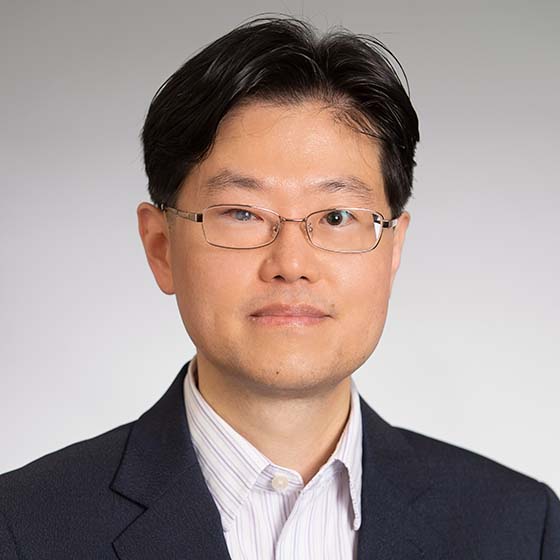Yoonseok Lee
Professor and Chair, Economics Department
Melvin A. Eggers Economics Faculty Scholar
Senior Research Associate, Center for Policy Research
Senior Research Associate, East Asia Program
Courses
- 2025 Summer
- ECN 670 Experience Credit
- 2025 Spring
- ECN 622 Econometrics II
- 2024 Summer
- ECN 670 Experience Credit
Highest degree earned
Bio
Yoonseok Lee is a professor of economics and a senior research associate in the Center for Policy Research. His research interests are in econometric theory and applied econometrics. His econometric theory topics focus on semi-parametric dynamic panel data models, treatment effect in panel data, many weak instrumental variables problems, and model selection in high dimensional models.
Lee's applied topics use semi-parametric panel data models to study cross country growth, environmental Kuznets curve, motorcycle helmet use regulation, smoking during pregnancy, medical treatment effects, crime and inequality, firm-level production function estimation, and relation between exporting and firm stock market value. For more policy-oriented topics, he is interested in social interaction models and income polarization problem. Lee received a Ph.D. in economics from Yale University in 2006.
Areas of Expertise
Research Interests
Nonparametric Econometrics and Machine Learning (nonparametric longitudinal models; nonparametric threshold and sample splitting; lasso and shrinkage estimation; model selection; model averaging; statistical depth; many weak moments problem)
Applied Econometrics (social interaction and segregation; production function estimation; income polarization and crime; forecast combination; risk preference; firm efficiency; AI and knowledge production)
Selected Publications
- Journal Articles
- Lee, Y., Horrace, W. C. and Cai, J., "Identification and Estimation of Panel Semiparametric Conditional Heteroskedastic Frontiers with Dynamic Inefficiency." Econometric Reviews, 2024.
- Lee, Y., Wang, Y., "Testing for Homogeneous Thresholds in Threshold Regression Models." Econometric Theory, 2024.
- Lee, Y., Sul, D., "Depth-Weighted Forecast Combination: Application to COVID-19 Cases." Advances in Econometrics, 2023.
- Lee, Y., Sul, D., "Depth-Weighted Means of Noisy Data: An Application to Estimating the Average Effect in Heterogeneous Panels." Journal of Multivariate Analysis, 2023.
- Lee, Y., Lovely, M. E. and Pham, H., "Dynamic and Non-Neutral Productivity Effects of Foreign Ownership: A Nonparametric Approach." Journal of Applied Econometrics, 2023.
- Lee, Y., Horrace, W. C. and Jung, H., "LASSO for the Stochastic Frontier Models with Many Efficient Firms." Journal of Business & Economic Statistics, 2023.
- Lee, Y., Wang, Y., "Threshold Regression with Nonparametric Sample Splitting." Journal of Econometrics, 2023.
- Lee, Y., Sul, D., "Trimmed Mean Group Estimation." Advances in Econometrics, 2022.
- Book Chapter
- Lee, Y., Han, C., "Panel Data Analysis in Public Finance: Methods and Applications (in Korean)." In Learning and Applying Methods for Analyzing Tax and Fiscal Systems. Korea Institute of Public Finance, 2024.
Presentations and Events
2026 ASSA Meeting, America Economic Association & Korea-America Economic Association (January 3, 2026 - January 5, 2026)
2025 World Congress of the Econometric Society, "Identifying Common Trend Determinants in Panel Data" (August 18, 2025 - August 22, 2025)
KREI-KAEA Joint Conference, Korea Rural Economic Institute (August 14, 2025 - August 14, 2025)
Korea Advanced Institute of Science & Technology (KAIST), "Policy Analysis with Panel Data" (August 11, 2025 - August 13, 2025)
100th Annual Conference of the Western Economic Association International , Korea-America Economic Associationc (June 20, 2025 - June 24, 2025)
University of Miami, "Identifying Common Trend Determinants in Panel Data" (November 22, 2024)
Pusan National U, "Non-/Semi-parametric Econometrics" (September 26, 2024 - September 27, 2024)
Korea Advanced Institute of Science & Technology (KAIST), "Policy Analysis with Panel Data" (September 23, 2024 - September 25, 2024)
KAEA-AEA Workshop (in 2024 ASSA meeting), Korea-America Economic Association (January 5, 2024 - January 7, 2024)
93rd Southern Economic Association Meeting, Korea-America Economic Association (November 18, 2023 - November 20, 2023)
Advances in Econometrics Conference in honor of Joon Y. Park, Indiana U, "Threshold Regression with Nonparametric Sample Splitting" (September 29, 2023 - September 30, 2023)
Korea U, "Testing for Long-horizon Co-movement in Nonstationary Panel Series and Its Applications" (August 1, 2023)
Pusan National U, "A Short Course on Non-/Semi-parametric Econometrics" (July 24, 2023 - July 27, 2023)
Korea Advanced Institute of Science & Technology (KAIST), "Introduction to Panal Data Analysis" (June 28, 2023 - June 30, 2023)
KIPF Research Methodology Monthly Meeting, Korea Institute of Public Finance, "Panel Data Analysis in Public Finance" (June 29, 2023)
2023 Korean Economic Review International Conference, Korean Economic Association, "Group Identification with Common Long-Run Latent Trends in Heterogeneous Panels" (June 4, 2023 - June 5, 2023)
KIEP-KAEA Workshop, Korea Institute for International Economic Policy (April 15, 2023 - April 16, 2023)
KAEA-AEA Workshop (in 2023 ASSA meeting), Korea-America Economic Association (January 6, 2023 - January 8, 2023)
92nd Southern Economic Association Meeting (November 19, 2022 - November 21, 2022)
Korea U (2021 - 2022)
Korea Advanced Institute of Science & Technology (KAIST) (2021 - 2022)
2021 International Panel Data Conference (2020 - 2021)
2021 Korean Economic Review International Conference (2020 - 2021)
KAEA Seminar Series, Korea-America Economic Association (2020 - 2021)
NY Camp Econometrics XV, Syracuse U (2020 - 2021)
Honors and Accolades
Appreciation Award, Korea-America Economic Association (2026)
Appreciation Award, Korea-America Economic Association (2024)
Collaboration for Unprecedented Success and Excellence Grant, Syracuse University (January, 2019 - December, 2022)
Appleby-Mosher Research Grant, Syracuse University (2021)
Appleby-Mosher Research Grant, Syracuse University (2020)
